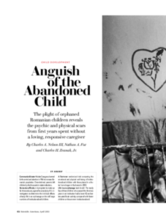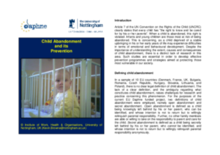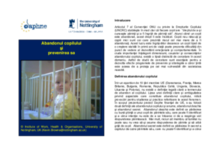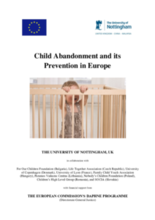Displaying 181 - 190 of 221
This report provides a summary of work undertaken by Lumos - together with governmental authorities, international partners, local medical professionals and families - to ensure that all children born with hydrocephalus receive the life-saving treatment they need, and which is their fundamental human right.
The objective of this study was to determine whether children's characteristics and/or institutional characteristics were predictors of severe punishments (including beatings) and/or frequency of punishments that children received from staff in Romanian institutions.
Pays particulièrement marqués par la crise et la pauvreté, la Roumanie, la Moldavie et la Bulgarie bénéficient depuis quelques années d’un programme de coopération pour les droits de l’enfant, le PROCOPIL. Depuis 2005, il a enregistré des résultats encourageants.
Published in Scientific American in 2013, this article describes the findings from the first-ever randomized trial comparing the emotional and physical well-being of institutionalized children with those placed in foster care in Bucharest, Romania.
This paper discusses the challenges of reforming the child welfare and protection systems in Hungary and Romania -two countries in transition from socialism to capitalism- and the impact on children, young people, families, and professionals. The focus is on the efforts made to deinstitutionalise children from large institutions, develop local prevention services, and develop alternatives to institutional care.
This document is an English language summary brochure of the Manual of Best Practice titled ‘Child Abandonment and its Prevention in Europe,’ specific to child abandonment in Romania.
This document is a Romanian language summary brochure of the Manual of Best Practice titled ‘Child Abandonment and its Prevention in Europe,’ specific to child abandonment in Romania.
This comprehensive manual provides an overview of child abandonment and its prevention in Europe, exploring the extent of child abandonment, possible reasons behind this phenomenon, the consequences of abandonment, and good practices in terms of prevention. For the purposes of the EU Daphne-funded project, child abandonment is defined in two ways, namely open and secret abandonment. Country specific in-depth reviews of child abandonment and its prevention are provided for 10 countries and results from an EU-wide survey analyzed.
This paper is based on research into the transition of young people leaving public care in Romania.
This paper discusses findings from a qualitative longitudinal study which explored the process of leaving long-stay institutional state care in Romania during 2002–4, a period at the heart of accelerated EU-enforced childcare reform.





